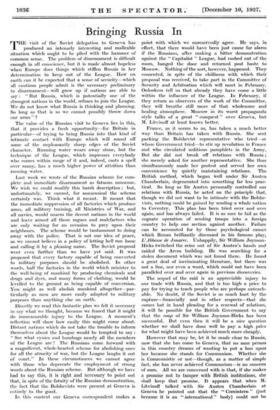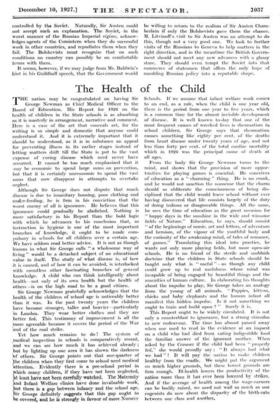Bringing Russia In
Irr HE visit of the Soviet delegation to Geneva has produced an intensely interesting and malleable situation which ought to be plied with the hammer of common sense. The problem of disarmament is difficult enough in all conscience, but it is made almost hopeless when Europe does things which stiffen Russia in her determination to keep out of the League. How on earth can it be expected that a sense of security—which all cautious people admit is the necessary preliminary to disarmament—will grow up if nations are able to say: "But Russia, which is potentially one of the Strongest nations in the world, refuses to join the League. We do not know what Russia is thinking and planning. So long as that is so we cannot possibly throw down our arms " ?
The value of the Russian visit to Geneva lies in this, that it provides a fresh opportunity—for Britain in particular—of trying to bring Russia into that kind of intimate contact with Europe which Will round off some of the unpleasantly sharp edges of the Soviet character. Running water wears away stone, but the technique of the League, which impresses everybody who comes within range of it and, indeed, casts a spell over many, has a much higher power of attrition than running water.
Last week we wrote of the Russian scheme for com- plete and immediate disarmament as fatuous nonsense. We wish we could modify this harsh description ; but, unfortunately, we cannot, for nonsensical the scheme certainly was. Think what it meant. It meant that the immediate suppression of all factories which produce arms, all military training, all Ministries of War, and all navies, would unarm the decent nations in the world and leave armed all those rogues and malefactors who are only waiting for an occasion to prey upon their neighbours. The scheme would be tantamount to doing away with the police. That is not our idea of peace, as we cannot believe in a policy of letting hell run loose and calling it by a pleasing name. The Soviet proposal went even further than we have yet said. It was proposed that every factory capable of being converted to military purposes should be abolished. In other words, half the factories in the world which minister to the well-being of mankind by producing chemicals and drugs and dyes, and many forms of clothing, would be levelled to the ground as being capable of conversion. You might as well abolish mankind altogether—par- ticularly as men are more easily adapted to military purposes than anything else on earth, Directly we read this fantastic plan we felt it necessary to say what we thought, because we feared that it might do immeasurable injury to the League. A moment's reflection will show how easily this might come about. Distant nations which do not take the trouble to inform themselves about the League would be tempted to say : "See what cynics and humbugs nearly all the members of the League are ! The Russians come forward with a magnificent, whole-hearted scheme for abolishing once for all the atrocity of war, but the League laughs it out of court." In these circumstances we cannot agree with those who deprecate the employment of strong words about the Russian scheme. But although we have had to say this, it is right and necessary to point out that, in spite of the fatuity of the Russian demonstration, the fact that the Bolshevists were present at Geneva is entirely to the good.
In this context our Geneva correspondent makes az point with which we unreservedly agree. He says, in effect, that there would have been just cause for alarm- if the Russians, after making a bitter demonstration against the " Capitalist " League, had rushed out of the room, banged the door and returned post haste to Moscow. Nothing of the sort, however, happened. They consented, in spite of the chilliness with which their proposal was received, to take part in the Committee of Security and Arbitration which will meet in February. Onlookers tell us that already they have come a little within the influence of the League. In February, if they return as observers of the work of the Committee, they will breathe still more of that wholesome and healing atmosphere. Moscow in its worst propaganda style talks of a great " conquest " over Geneva, but M. Litvinoff at least knows better.
France, as it seems to us, has taken a much better way than Britain has taken with Russia. She sent packing the Bolshevist representative who tried—or whose Government tried—to stir up revolution in France and who circulated seditious pamphlets in the Army. But she did not break off relations with Russia ; she merely asked for another representative. She thus simultaneously made her protest and served her own convenience by quietly maintaining relations. The British method, which began Well under Sir Austen Chamberlain, degenerated into something far less prac- tical. So long as Sir Austen personally controlled our relations with Russia, he acted on the principle that, though we did not want to be intimate with the Bolshe- vists, nothing could be gained by sending a whole nation to Coventry. This plan has been tried over and over again, and has always failed. It is as sure to fail as the cognate operation of sending troops into a foreign country to help one section against another. Failure can be accounted for by those psychological causes which Renan brilliantly discussed in his famous play, L'Abbesse de Jouarre. Unhappily, Sir William Joynson- Hicks twitched the reins out of Sir Austen's hands and raided the Arcos building. He was searching for a stolen document which was not found there. He found a great deal of incriminating literature, but there was not a line, nor even a word, which could not have been paralleled over and over again in previous discoveries. • The sequel of the raid is an appreciable injury to our trade with Russia, and that is too high a price to pay for trying to teach people who are perhaps. unteach- able. No doubt, if the Soviet is so much hurt by the rupture—financially and in other respects—that she comes hat in hand pleading for a renewal of relations, it will be possible for the British Government to say that the coup of Sir William Joynson-Hicks has been successful. But even then it will be a nice question whether we shall have done well to pay a high price for what might have been achieved much more cheaply.
However that may be, let it be made clear to Russia, now that she has come to Geneva, that no sane person in this country dreams of wanting to put a ban upon her because she stands for Communism. Whether she is Communistic or not—though, as a matter of simple fact, she has never achieved Communism—is no concern of ours. All we are concerned with is that, if she makes a promise not to tamper with British institutions, she shall keep that promise. It appears that when M. Litvinoff talked with Sir Austen Chamberlain at Geneva he pointed out that the "Comintern " (just because it is an "international " body) could not be controlled by the Soviet. Naturally, Sir Austen could not accept such an explanation. The Soyiet, ..in the worst manner of the Russian Imperial regime, acknow- ledges agents of . the Comintern when they do successful work in other countries, and repudiates them when they fail. The Bolshevists must recognize that on such conditions no country can possibly be on comfortable terms with them.
It seems, however, if we may judge from Mr. Baldwin's hint in his Guildhall speech, that the Government would be willing to return to the realism of Sir Austen Cham- berlain if only the Bolshevists gave them the chance. M. Litvinoff's visit to Sir Austen was an attempt to do this, though not a very good one. We look to further visits of the Russians to Geneva to help matters in the right direction, and in the meantime the British Govern- ment should not meet any new advances with a glassy stare. They should even tempt the Soviet into that commerce of statesmen that offers the only hope of moulding Russian policy into a reputable shape.











































 Previous page
Previous page